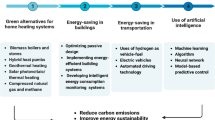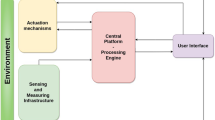Abstract
The annual consumption of coal resources by the combustion process is significant, and the associated environmental degradation has gotten worse. Enhancing the combustion system of power plant boilers to increase energy conversion efficiency and support sustainable development has become a significant research goal in light of this crucial problem. If the combustion process is not properly optimized, it dangerously contaminates the atmospheric environment in addition to wasting coal resources and undermining coal usage. In light of this, this study creates an enhanced fuzzy neural network-based boiler combustion model and a boiler combustion optimization control system that is supported by Internet of Things technology. In order to facilitate fuel mixing in the furnace, the system modifies the amount of coal in each coal feeder depending on the quality of the coal entering the feeder. Lastly, the model's effectiveness is assessed. According to the results, the improved model performs better than the conventional model in terms of computational complexity and generalizability. Boiler combustion rate and NOx emissions are accurately predicted by the method, with errors under 0.84% and 3.6%, respectively.






Similar content being viewed by others
Data availability
The dataset can be accessed upon request.
References
Ahn CK (2010) Delay-dependent state estimation for TS fuzzy delayed Hopfield neural networks. Nonlinear Dyn 61:483–489
Bhavani NPG, Sujatha K, Ponmagal RS et al (2017) Monitoring of SO2 emissions in power plants using Internet of Things. In: 2017 International conference on energy, communication, data analytics and soft computing (ICECDS), IEEE, pp. 1064–1067
Chunlai B, Jingfei Z (2013) Combustion optimization of power plant boiler based on RBF neural network model. Power Gener Equip 27(02):97–100
Effendy N, Kurniawan ED, Dwiantoro K et al (2022) The prediction of the oxygen content of the flue gas in a gas-fired boiler system using neural networks and random forest. IAES Int J Artif Intell 11(3):923
Fang L (2011) Boiler combustion optimization based on neural network and genetic algorithm, North China Electric Power University, Baoding
Jiangtao F (2015) The influence of boiler heating surface transformation on boiler desuperheating water volume. Shandong Ind Technol 04:31–31
Karthick SA, Sakthivel R, Ma YK et al (2019) Disturbance rejection of fractional-order TS fuzzy neural networks based on quantized dynamic output feedback controller. Appl Math Comput 361:846–857
Li N, Hu Y (2020) The deep convolutional neural network for NOx emission prediction of a coal-fired boiler. IEEE Access 8:85912–85922
Liu L, Guo X, Lee C (2021) Promoting smart cities into the 5G era with multi-field Internet of Things (IoT) applications powered with advanced mechanical energy harvesters. Nano Energy 88:106304
Meiru Z (2021a) Application of distributed regional protection technology in coal mine power supply system. Shaanxi Coal 40:142–146
Meiru Z (2021b) Application of distributed regional protection technology in coal mine power supply system. Shaanxi Coal 40(01):142–146
Shi K, Wang J, Zhong S et al (2020) Non-fragile memory filtering of TS fuzzy delayed neural networks based on switched fuzzy sampled-data control. Fuzzy Sets Syst 394:40–64
Song J, Romero CE, Yao Z et al (2016) Improved artificial bee colony-based optimization of boiler combustion considering NOX emissions, heat rate and fly ash recycling for on-line applications. Fuel 172:20–28
Sujatha K, Bhavani NPG, Reddy TK et al (2017) Internet of Things for flame monitoring power station boilers. In: 2017 Trends in industrial measurement and automation (TIMA), IEEE, pp. 1–7
Sun (2012) Modeling of boiler combustion process based on Bayesian network and fuzzy neural network. North China Electric Power University, Beijing
Wei R (2020) Self-powered wireless sensors with dual-modality sensing for Internet of Things (IoT) applications, Case Western Reserve University, Cleveland
Xiang He, Dafu Ma, Jing J (2021) Combustion optimization of swirl opposed firing boiler for reducing CO emission. J Power Eng 1(07):33–41
Xiaolan W, Shasha C (2021) Research on the application of Internet of Things technology in abnormal fault monitoring of coal mine equipment. Energy Environ Prot 43(07):182–188
Xiaoqin Z (2021) Attack detection model of SCADA system based on data preprocessing and improved ELM. J Nanjing Univ Aeronaut Astronaut 53(05):708–717
Xue J, Shen B (2020) A novel swarm intelligence optimization approach: sparrow search algorithm. Syst Sci Control Eng 8(01):22–34
Yan F (2021) Combustion optimization modeling of power plant boiler based on constrained support vector regression. Therm Power Eng 36(11):26–132
Yang G, Wang Y, Li X (2020) Prediction of the NOx emissions from thermal power plant using long-short term memory neural network. Energy 192:116597
Ze D, Ning Ma, Lei M (2019) Model improvement for boiler NOx emission based on DEQPSO algorithm. J Chin Soc Power Eng 39(03):191–197
Zeng G, Xu M, Tu Y et al (2020) Influences of initial coal concentration on ignition behaviors of low-NOx bias combustion technology. Appl Energy 278:115745
Zhang H, Qiu M, Yu X et al (2022) Application of boiler optimization monitoring system based on embedded Internet of Things. Math Probl Eng 2022:1–12
Funding
This work received no funding.
Author information
Authors and Affiliations
Corresponding author
Ethics declarations
Conflict of interest
The authors have no conflict of interest.
Ethical approval
The paper does not deal with any ethical problems.
Informed consent
We declare that all the authors have informed consent.
Additional information
Publisher's Note
Springer Nature remains neutral with regard to jurisdictional claims in published maps and institutional affiliations.
Rights and permissions
Springer Nature or its licensor (e.g. a society or other partner) holds exclusive rights to this article under a publishing agreement with the author(s) or other rightsholder(s); author self-archiving of the accepted manuscript version of this article is solely governed by the terms of such publishing agreement and applicable law.
About this article
Cite this article
Xu, Z., Wu, C. Optimization strategy design and simulation of power plant boiler combustion system based on Internet of Things and fuzzy neural network in the context of sustainable development. Soft Comput (2023). https://doi.org/10.1007/s00500-023-08478-1
Accepted:
Published:
DOI: https://doi.org/10.1007/s00500-023-08478-1




